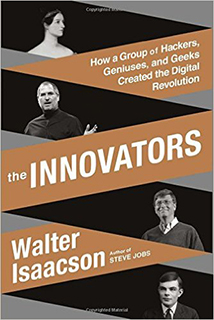Recommended Textbook:

"The Innovators: How a Group of Hackers, Geniuses, and Geeks Created the Digital Revolution"
By Walter Issacson
Simon & Schuster
ISBN 147670869X
Course number:
CSE/ISE 301
Course title:
"History of Computing "
Course description:
A study of the history of computational devices from the early ages through the end of the 20th century. Topics include needs for computation in ancient times, deveopment of computational models and devices through the 1800's and early 1900's, World War II and the development of the first modern computer, and early uses in business. Creation of programming languages and the microchip. Societal changes in computer usage due to the microcomputer, emergence of the Internet, the World Wide Web, and mobile computing. Legal and social impacts of modern computing. Cannot be used as a technical elective for the CSE major or minor. This course is offered as both CSE 301 and ISE 301.
Prerequisite(s):
•
You should be a student at the U2, U3 or U4 level that has taken at least one course in computer science or one course requiring significant use of computers.
• This course cannot be used to satisfy a technical elective requirement for CSE and ISE majors.
• This course cannot be used to satisfy the upper-level course requirement for CSE minors.
• This course can be used to satisfy DEC H requirements or to satisfy a free elective requirement for CSE and ISE majors.
• This course can be used to satisfy the minimum number of upper-level courses required by the university for graduation.
Number of credits:
3 hours lecture; 3 credits
Course Topics:
• Early Computational Devices and Number System, Charles Babbage and
the Analytical Engine, Computing in the 1800s
• Analog computing, the development of formal computing models: Computing
in the early 1900s, World War II and the Advent of Modern Computers in the 1940s
• Computers become a Business Tool, Mainframe Computing in the 1950s, Early
history of software and programming languages, The computing industry in the
1960s, the rise of IBM.
• The impact of the microprocessor in the 1970s, Moore's Law, new CPUs,
The personal computer, modern input devices, The Graphical Interface, the rise
of Microsoft.
• The Quest for Intelligent machines, Development of the Internet and the
World Wide Web, Mobile and wireless computing emerges, Legal and Social Impacts
of Modern Computing.
Course Outcomes:
• To study the historical, political, and social events that led to the development of modern computational devices.
• To examine the lives of some of the most influential inventors, thinkers and entrepreneurs of the computer revolution.
• To understand how computer hardware and software evolved based on social and economic forces in the 20th century.
• To consider current social, legal and ethical issues in computer science and determine the factors that led to these modern problems.
Recommended Textbook:

"The Innovators: How a Group of Hackers, Geniuses, and Geeks Created the Digital Revolution"
By Walter Issacson
Simon & Schuster
ISBN 147670869X
Course webpage:
http://www3.cs.stonybrook.edu/~tony/comphist/
Course email:
Student Accessibility Support Center: If you have a physical, psychological, medical, or learning disability that may impact your course work, please contact the Student Accessibility Support Center, Stony Brook Union Suite 107, (631) 632-6748, or at sasc@stonybrook.edu. They will determine with you what accommodations are necessary and appropriate. All information and documentation is confidential.
Academic Integrity: Each student must pursue his or her academic goals honestly and be personally accountable for all submitted work. Representing another person's work as your own is always wrong. Faculty is required to report any suspected instances of academic dishonesty to the Academic Judiciary. Faculty in the Health Sciences Center (School of Health Professions, Nursing, Social Welfare, Dental Medicine) and School of Medicine are required to follow their school-specific procedures. For more comprehensive information on academic integrity, including categories of academic dishonesty please refer to the academic judiciary website at http://www.stonybrook.edu/commcms/academic_integrity/index.html
Critical Incident Management: Stony Brook University expects students to respect the rights, privileges, and property of other people. Faculty are required to report to the Office of Student Conduct and Community Standards any disruptive behavior that interrupts their ability to teach, compromises the safety of the learning environment, or inhibits students' ability to learn. Faculty in the HSC Schools and the School of Medicine are required to follow their school-specific procedures. Further information about most academic matters can be found in the Undergraduate Bulletin, the Undergraduate Class Schedule, and the Faculty-Employee Handbook.
Course Evaluation: Each semester Stony Brook University asks students to provide feedback on their courses and instructors through an online course evaluation system. The course evaluation results are used by the individual faculty, department chairs and deans to help the faculty enhance their teaching skills and are used as part of the personnel decision for faculty promotion and tenure. No individually identifiable data are ever reported back to the university or instructor. Students who have completed previous evaluations can view all faculty ratings at: https://classie-evals.stonybrook.edu/
Instructor:
Tony Scarlatos
anthony.scarlatos@stonybrook.edu